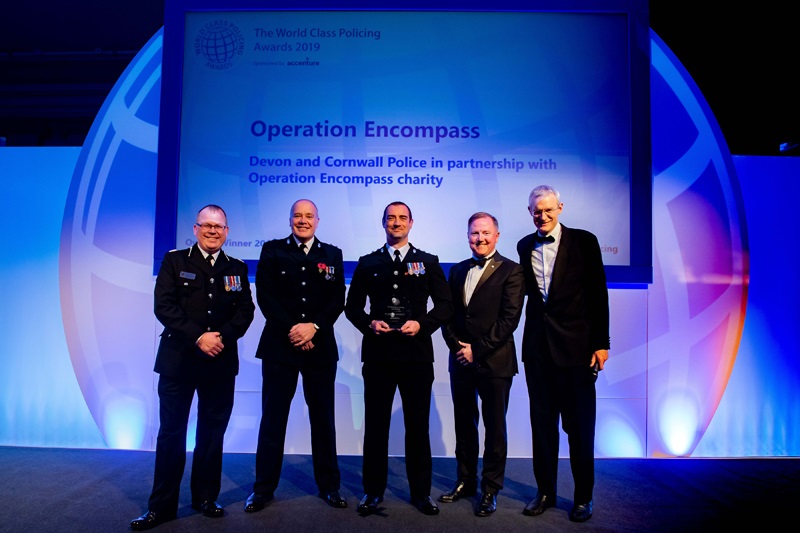A scheme to protect and support children exposed to domestic abuse has taken the top prize at the prestigious World Class Policing Awards, sponsored by Accenture.
As a charity, a police and education collaboration, Encompass is exceptional and most importantly it has been sustained.
Judge, World Class Policing Awards
Devon and Cornwall Police’s Operation Encompass scooped the top spot for an information-sharing initiative which ensures that when a child witnesses domestic abuse the school is informed immediately so the child can receive the appropriate support.
Originally the brainchild of Elisabeth Carney-Haworth, a head teacher with 40 years experience, and David Carney-Haworth, a former Sergeant in Devon and Cornwall Police, Encompass has now helped thousands of vulnerable children across the UK and abroad. Latest figures show it supported 46,500 children in just 190 days (2018-19) across the seventeen forces that have adopted the scheme. Around 130,000 children in the UK are thought to live in households with a high risk of domestic abuse.
The World Class Policing Award judges, who were drawn from across the entire policing field, said they were deeply moved by what Encompass had achieved.
“This deals with a perennial issue that happens behind closed doors, affects generations and has a pernicious effect on society.
“As a charity, a police and education collaboration, Encompass is exceptional and most importantly it has been sustained. It has now had almost complete UK saturation and has spread to other countries.”
Devon and Cornwall Police beat off competition from over 100 entries to the World Class Policing Awards from across the world to win the prestigious award. Attendees at the special ceremony included Chief Police officers, including New Zealand Police Commissioner Mike Bush who presented one of the awards, as well as the winners, their partners and the awards’ sponsors.
Norfolk Police’s ‘brilliant’ Operation Moonshot was praised for making real improvements at a local level to disrupt criminality and prevent crime.
A total of 54 finalists attended the glittering awards ceremony which was held at London’s Grosvenor House Hotel in Park Lane and compered by the BBC presenter and broadcaster Jeremy Vine. Six winners were chosen, including an overall winner, alongside six ‘highly commended’.
Other winners on the night included Bedfordshire Police’s Operation Polarity, a highly-complex, three-year international cyber-investigation that led to ground-breaking new investigative methodologies and set the standard for subsequent investigations.
Judges described Polarity as ‘world class, leading-edge policing’ which scored full marks for the development and use of new technologies, the degree of international collaboration and the reach and legacy left behind in terms of tools and learning for others.
New Zealand Police’s Mobility Programme was also a winner on the night. With this clever development of specialised apps that fully support officers in the field, Mobility has massively reduced the time previously wasted returning to the station to complete administrative tasks, enabling officers to work more efficiently and effectively.
Judges called Mobility ‘an exceptional example of a great use of IT, delivering outcomes to keep a country as safe as possible’.
Norfolk Police’s ‘brilliant’ Operation Moonshot was praised for making real improvements at a local level to disrupt criminality and prevent crime. Judges singled out the project’s innovative use and integration of academic theory.
Limelight’s work led to the signing of an international protocol with the United States and this major safeguarding operation is now replicated across multiple US cities.
“This evidence-based initiative is making real improvements to policing at a local level, delivering results and taking full account of officer safety.”
The team behind the response to the Novichok poisonings in Salisbury and Amesbury that seriously injured several people including a police officer and led to the tragic death of local resident Dawn Sturgess were recognised for their incredible multi-partnership response to an unprecedented attack in the UK that took place the glare of the world’s attention.
Summing up their contribution, one WCPA judge said: “The degree of collaboration, the approach to staff and public health and well-being, the need to sustain public confidence in circumstances of intense global media scrutiny and the institutional legacy (the HERC) are all marked as outstanding.”
Queensland Police also won for their Tactical First Aid Project that has trained 11,000 frontline officers in vital life-saving first aid techniques that have had an ‘immediate and clear life-changing and life-saving benefits to individuals and the wider community’.
In addition to the five winners, and the overall winner, six further teams were highly commended.
A top 10 best practice demand and reduction initiative, as recognised by the College of Policing, one judge called the Community Peer Mentor Project ‘both a brilliant initiative and a heart-warming story’.
Dubai Police’s Operation Stalker led to the capture of an international drugs ring and seizure of drugs with a street value of $80million and was highlighted by the judges for its particularly innovative use of facial recognition and UAV.
The Metropolitan Police Service’s Operation Limelight was highly commended for their far-reaching approach to tackling FGM ‘under immense international scrutiny which directly affects police legitimacy’. Their work led to the signing of an international protocol with the United States and this major safeguarding operation is now replicated across multiple US cities. One judge called it ‘an excellent example of collaborative approach to a sensitive crime, involving police, UK Border Force and charities’.
In addition to being crowned overall winner, Devon and Cornwall Police also received a highly commended for their work with the Jewish community in the wake of a terrorist attack on Exeter City’s Synagogue. It was highlighted for demonstrating not only the importance of every officer in the fight against terror, but also the importance of working closely with all agencies and sharing information effectively.
Durham Police’s Community Peer Mentor project was also recognised for its impact on reducing demand on police resources. Developed in conjunction with the Durham Police and Crime Commissioner and Darlington Borough Council, the initiatve uses volunteers with lived experience to support the most vulnerable in society who understandably turn to the police in a time of need, but it is often other support that is required.
Judges found the force – PSNI – showed ‘significant innovation, collaboration, independent evaluation and positive results in a complex environment’.
A top 10 best practice demand and reduction initiative, as recognised by the College of Policing, one judge called the Community Peer Mentor Project ‘both a brilliant initiative and a heart-warming story’.
Another judge said the initiative was ‘a proper academic, social care, policing and NGO collaboration that gets to the heart of repeat victimisation and real local community chronic problems’.
Queensland Police also scored a highly commended for their Alcohol Harm Reduction initiative aimed at the night-time economy areas that has led to a significant reduction in arrests for assaults.
Judges said the project not only reduced assaults and harm, but, by using early intervention and engagement, improved police legitimacy and could be replicated in other similar locations.
The Police Service of Northern Ireland also picked up a highly commended award for its innovative and far-reaching approach to public consultation. Judges found the force showed ‘significant innovation, collaboration, independent evaluation and positive results in a complex environment’.
Summing up the contribution all the finalists have made to policing, Stephen Kavanagh, Chair of The World Class Policing Awards Steering Committee and former Chief Constable of Essex Police, said: “The World Class Policing Awards have been able to pull together and identify some outstanding pieces of police work from across the world.
“From countering terrorist attacks, to supporting the vulnerable through to better use of technology to improve learning – sharing these examples will save time and money and celebrate the very best of World Class Policing.”
Policing Insight will be following up on the winners, those that have been highly commended and other finalists in the coming weeks to recognise their achievements and to spread excellent policing practice.



